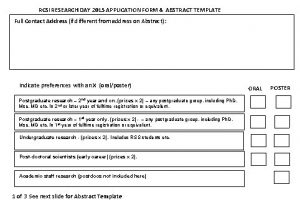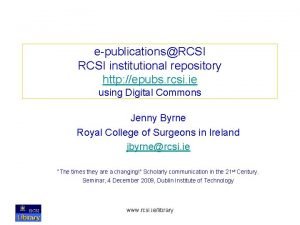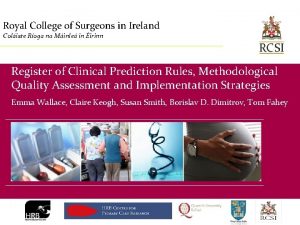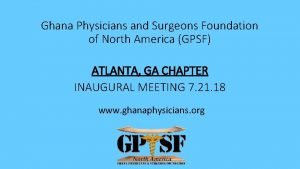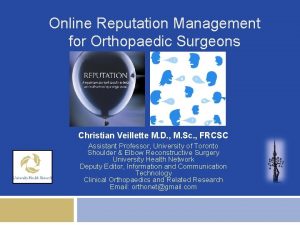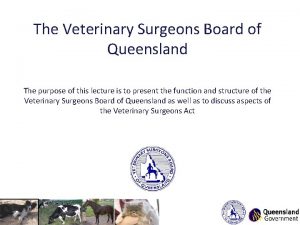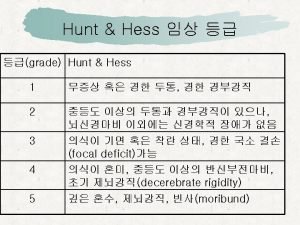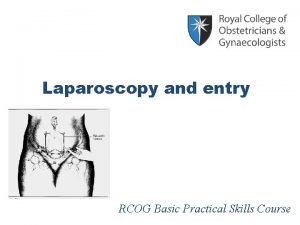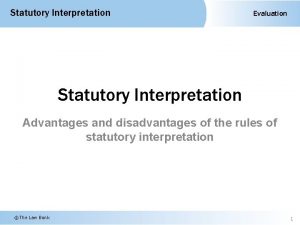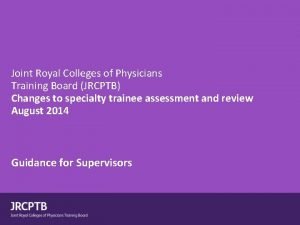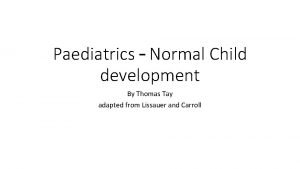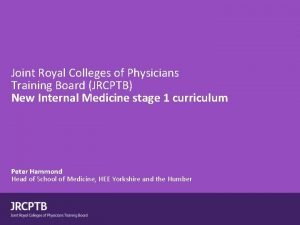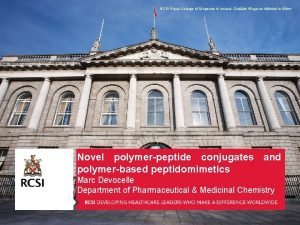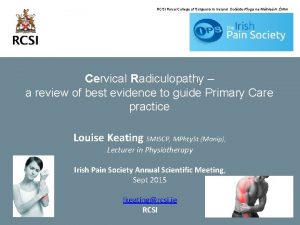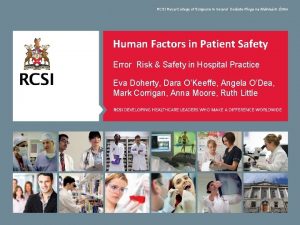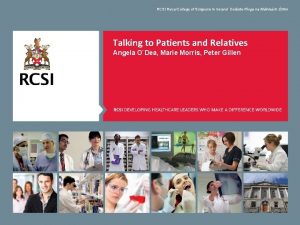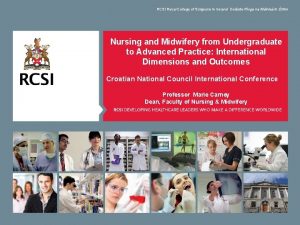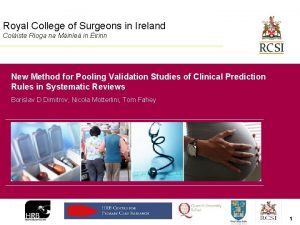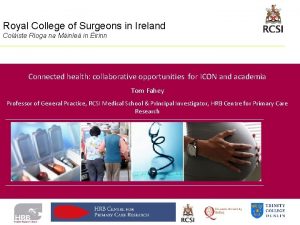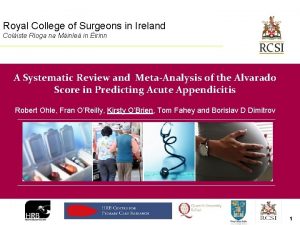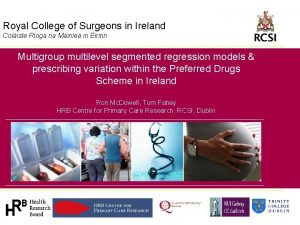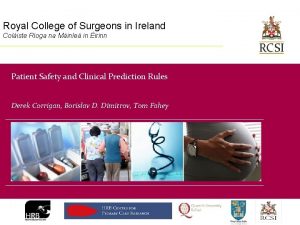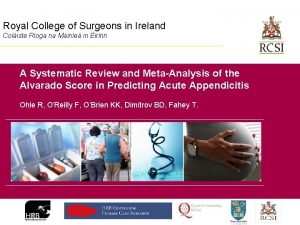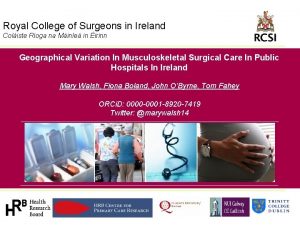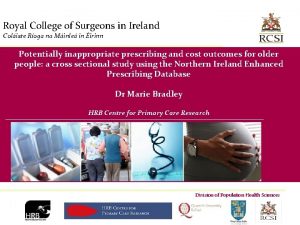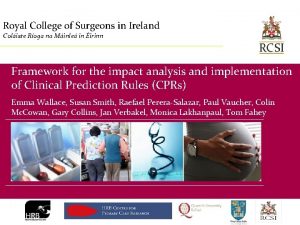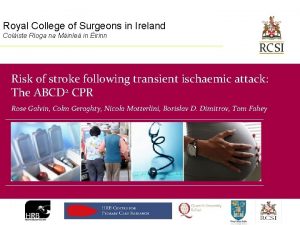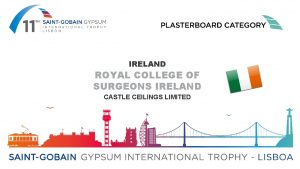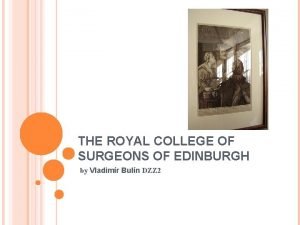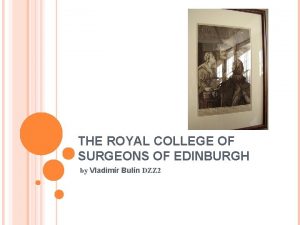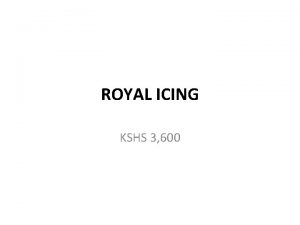RCSI Royal College of Surgeons in Ireland Coliste





















- Slides: 21

RCSI Royal College of Surgeons in Ireland Coláiste Ríoga na Máinleá in Éirinn Patient Education in the Community – The Irish & Australian Perspective Emer Shanley, Ph. D Scholar, RGN, PG Dip Tissue Viability & Wound Mgmt, MSc Research, HRB Fellow.

Patient Education Concepts Health Literacy Literature Availability Patient Education Self Efficacy Self Management Chronic Care Model

Education Delivery • • • Guidelines Health promotion Patient Information Leaflets Computer-aided technology Multi-media approach

Irish Perspectives of LUPP • A cluster randomised trial of a leg ulcer prevention programme (LUPP) in venous leg ulcer patients within an Irish community care setting. • Quantitative research approach using a cluster randomised, open label design. • However, qualitative data was captured which provided insight into the patient perspective of the programme.

LUPP findings • Knowledge scores statistically significantly improved, control group knowledge scores lower • Leg exercises, elevation and skin care reported post. LUPP • No difference for nutrition, 76% poor fluid intake • Satisfaction with LUPP high • Older participants learnt more consistently • Participants wearing no compression reduced from 18% to 4% in intervention group • Results consistent with original Australian study

Qualitative findings • • Leg ulcer journey Increased activity Patient Empowerment Impact of Pain

Further Research § Cochrane Systematic Review: “Patient education for preventing venous leg ulceration” (Funded by the Health Research Board of Ireland) Shanley E, Moore ZEH. Patient education for preventing venous leg ulceration. Cochrane Database of Systematic Reviews 2015, Issue 5. Art. No. : CD 011696. DOI: 10. 1002/14651858. CD 011696. SHANLEY, E. 2012. A cluster randomised trial of the leg ulcer prevention programme (LUPP) in venous leg ulcer patients within an Irish Community Care setting. MSc Thesis, Royal College of Surgeons in Ireland.

Mens Health

Men's Health Promotion Group • primary care staff from the public health nursing department in West Cork, physiotherapy, dietician service, mental health services • aims to promote all aspects of health-both mentally and physically for men in our local community • service was initially developed for the local area and was delivered in local GAA clubs and agricultural shows • the team, in association with the GAA nationally, now collaborate with the Tony Fenton Foundation, with the aim of developing this service nationally.


Pressure Ulcer Prevention Programme(i. PUPP) • The European Pressure Ulcer Advisory Panel defines a pressure ulcer as “a localised injury to the skin and/or underlying tissue, usually over a bony prominence, resulting from sustained pressure (including pressure associated with shear). • A number of contributing factors are also associated with pressure ulcers; the primary of which is impaired mobility” (National Pressure Ulcer Advisory panel, 2014, Skerritt and Moore, 2014). • Pressure ulcers have a significant impact on patient’s lives with quality of life studies demonstrating that compared with similarly aged people; patients living with these wounds have a lower quality of life (HSE, 2009).

Research Questions The primary research question is: • What is the impact of a pressure ulcer prevention education programme: “i. PUPP” on the knowledge of pressure ulcer prevention, amongst older people, with reduced mobility, living independently in the community? The secondary research questions is: • What is the impact of a pressure ulcer prevention education programme: “i. PUPP” on attitudes and behaviours and incidence of pressure ulcers, amongst older people, with reduced mobility, living independently in the community?

Study Aim The aims of this study are to: 1. Develop a pressure ulcer prevention education programme: “i. PUPP” 2. Evaluate the impact of the programme on older persons’ with reduced mobility, living independently in the community in terms of: a. Participant’s knowledge of pressure ulcer prevention. b. Participant’s attitudes and behaviours towards pressure ulcer prevention. c. Pressure ulcer incidence. d. Participants perceptions of the i. PUPP.

Study Objectives The objectives of this study are to: • • Determine baseline knowledge of the prevention of pressure ulcers among the study participants. Establish baseline pressure ulcer incidence among the study participants. Develop an evidence based education programme for older people with focus on the prevention of pressure ulcers (i. PUPP). Measure the impact of i. PUPP on older persons’ knowledge of, and attitudes and behaviours towards pressure ulcer prevention. Establish the impact of the i. PUPP on pressure ulcer incidence amongst the study participants. Determine the participants perceptions of the i. PUPP. Make recommendations for practice and policy.

Intervention A Pressure Ulcer Prevention Programme (i. PUPP) is currently being developed by the researcher to address the key tenets of pressure ulcer prevention as described by the SKIN bundle. These are: • S-Skin assessment • K-Keep moving • I-Incontinence • N-Nutrition The i. PUPP is a multimedia programme that will be delivered using electronic media, hard copy materials, activities and patient diaries.

Data to be collected Baseline demographic data: • European Minimum Dataset • Malnutrition Universal screening Tool-MUST • Braden pressure ulcer risk assessment • Pre and post i. PUPP questionnaire (KPUP) containing questions focused on participant’s knowledge, attitudes and behaviours towards pressure ulcer prevention. • The participant’s skin over anatomical areas subject to pressure/shear will be assessed using the sub epidermal moisture scanner (SEM) • Visual skin assessment (VSA) Pressure ulcers will be classified using the EPUAP/NPUAP 2014 pressure ulcer grading system • Up to 10 participants will be interviewed post i. PUPP, using semi-structured interviews to capture their perceptions of using the i. PUPP.

Patient Knowledge of Pressure Ulcer Prevention Tool (KPUP) • Following an extensive literature search the researcher was unable to find a validated tool to measure patients’ knowledge of pressure ulcer prevention. • This led to a new phase in the study- Pressure Ulcers: Development and psychometric evaluation of the Patient Knowledge towards Pressure Ulcer Prevention Instrument (KPUP)

Research Question & Study Aim • Is the Patient Knowledge towards Pressure Ulcer Prevention instrument (KPUP) a reliable and valid instrument for assessing patient’s knowledge of, and attitudes and behaviours towards pressure ulcer prevention? • The aim of this study is to develop and to evaluate the psychometric characteristics of the Patient Knowledge towards Pressure Ulcer Prevention instrument (KPUP).

Study Design • This study will comprise of a two-phase prospective psychometric instrument validation study. Phase 1 includes the design of the instrument and Phase 2 includes the psychometric evaluation of the instrument. • The psychometric evaluation will include the evaluation of the construct validity (factor analysis, discriminating power and internal consistency) and stability reliability testing of the instrument.


Thank you • Thank you for listening. • Thank you to the Institute of Community Health Nursing for inviting me to speak today. • Special thanks to my eternally patient supervisors, Professor Zena Moore and Dr. Declan Patton • This research is kindly funded by a grant from the School of Nursing and Midwifery, Royal College of Surgeons in Ireland.
 Judith gilroy rcsi
Judith gilroy rcsi Rcsi research day
Rcsi research day Rcsi poster template
Rcsi poster template Rcsi repository
Rcsi repository Coliste
Coliste Ghana physicians and surgeons foundation
Ghana physicians and surgeons foundation Reputation management for surgeons
Reputation management for surgeons Vsb
Vsb Wfns scale
Wfns scale Rcog course
Rcog course Advantages and disadvantages of statutory interpretation
Advantages and disadvantages of statutory interpretation Joint royal college of physicians training board
Joint royal college of physicians training board Royal college of nursing v dhss 1981
Royal college of nursing v dhss 1981 Thomas tay
Thomas tay Group 2 specialties
Group 2 specialties Royal military college of science
Royal military college of science Royal college of occupational therapists
Royal college of occupational therapists Early college high school at midland college
Early college high school at midland college Wake tech admissions
Wake tech admissions Star of wonder star of night star of royal beauty bright
Star of wonder star of night star of royal beauty bright A royal mystery
A royal mystery Battle royal story
Battle royal story


